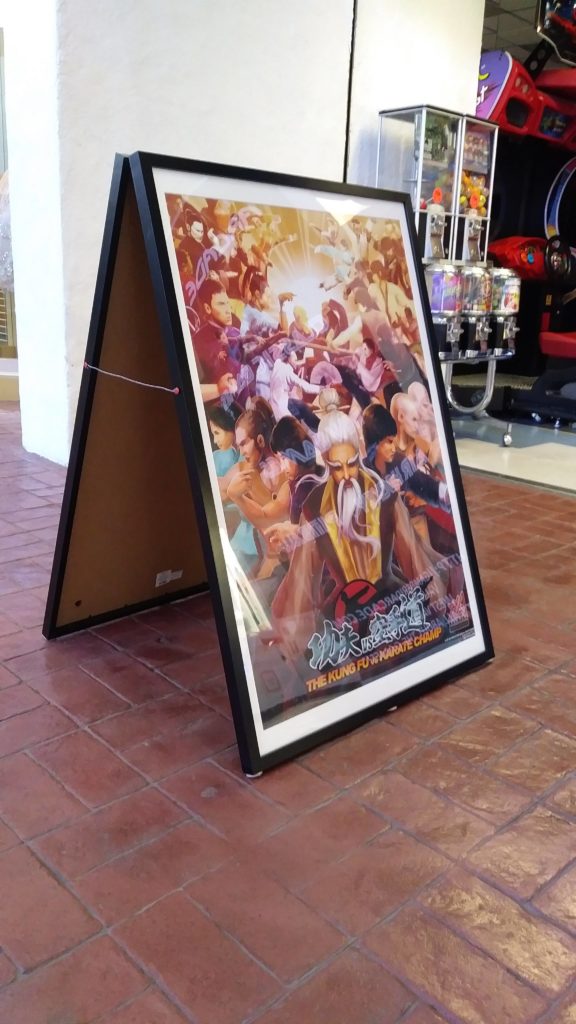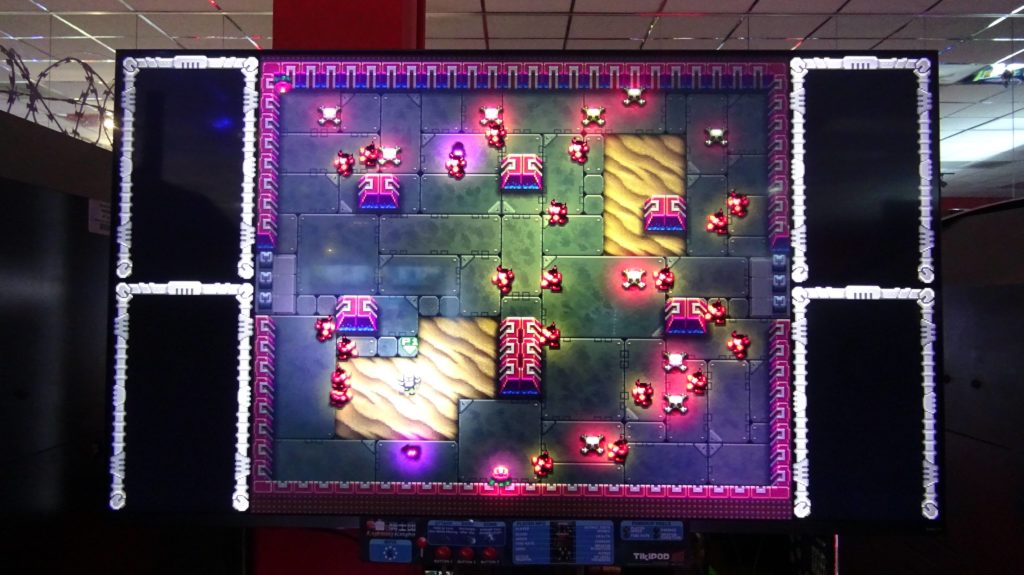The exA-Arcadia System
The Modern Neo-Geo MVS?
by Adam Pratt, Arcade Galactic & ArcadeHeroes.com
Among the arcade platforms I’ve owned over the years that have truly earned their keep, I would put the Neo-Geo MVS by SNK right near the top. The versatility of the platform, offering an easy way to swap out games, is still something that gets played today, and at this point, most games are quite affordable and are able to pay themselves off in a relatively short time. It even has new games coming along for it every now and then, which is a nice bonus.
That said, the system came out in 1990, so while it gets played, it’s more nostalgia play than anything else, and it can’t hold a candle to any of my brand-new titles in terms of earnings and customer draw. Still, what if there was something like the MVS, but brand new?
Enter the exA-Arcadia, which promises to do exactly that, but for today’s arcade scene.
I was first contacted by the CEO of the company, Eric Chung, back at the end of 2017. He laid out his vision for what the platform would be, which was easy enough for an operator like me to grasp given that it was an updated Neo-Geo business model.

The exA board was initially offered as a kit that could go into JVS cabinets (JAMMA cabinets with an adapter), and supported everything from old CRT cabinets to state-of-the-art 4K cabinets. The system itself is a powerful PC platform that uses small cartridges to deliver the games. Up to four games can be installed at one time; the system features a menu in the attract mode that allows the user to pick the game that suits their fancy. It also features strong security measures to nip piracy in the bud (as best as possible) and several developers with a history in the arcade business have signed on to produce content for it.
As of this writing, 16 different games are available, most hailing from the scrolling shooter (shoot-’em-up, aka “shmup”) and fighter genres. A few other “dead” (for the arcade) genres are joining the mix, including 2D platformers, run-’n’-gunners like Contra, dungeon crawlers and more.
While most of the titles so far are available on home gaming platforms, all exA ports are required to have some unique content to them, be it new characters, new levels and/or new music. The games also tend to be heavily rebalanced so that they play better for what arcades need. As one example, Super Battle Princess Madelyn, available on consoles without the “Super” moniker, plays like an entirely different game, making the arcade experience a unique one that players can seek out.
Part of the update to the business model was to address a major problem in the arcade business over in Japan. Since the mid-2000s, the revenue share model had become the dominant way operators got equipment. This is even true of purchases. In Japan, when you buy a machine, there is still a revenue share fee from the developer that has to be paid on every play. The last time that you could buy a game and not pay any fees on it was 2009 (or by importing something from overseas). This issue was exacerbated when the Japanese government began taxing arcades, leaving very little left for small operators. The exA addresses this by allowing ops to purchase a board, then own it without having to pay anyone else additional fees just like they used to.
While we don’t have quite the same problem here, the potential was obvious. Kits have become pretty uncommon in today’s market, with games becoming bigger and more expensive. While there is a benefit to the pomp and flash that we get out of these games –– I certainly can’t complain about how dedicated modern games earn –– there is still a place for us small fries or street operators who simply can’t throw the latest 10’ wide machine into a space.
This also opens the potential for content like we haven’t seen since the 1990s. Back in the “Golden Age” of arcade gaming, it was normal for there to be 200-300 new titles released every year. In recent times, that number has been more around 20-25, not counting new redemption pieces. When most of those can cost over $10,000, that limits what most venues can add to their floors each year. (It’s either that or you simply don’t buy anything new and wait for these pieces to come down in price after a few years.)

Thanks to the exA-Arcadia system, we can get a lot more, and it was thanks to them that 2020 wasn’t a complete loss in terms of new launches. The platform was launched in Japan in November 2019 with Aka & Blue Type-R, a scrolling shoot-’em-up, and in January 2020, they launched The Kung Fu Vs. Karate Champ, a 1v1 fighting game. I was one of the first operators in the U.S. to jump on this, ordering a custom FunGlo cabinet from Fun Company and finding a great 4K gaming TV to combine with it. My system with both of the aforementioned games arrived at the very end of January 2020, allowing me to promote brand new games and from genres that have been realistically dead in the U.S. for several years.
It was thanks to this platform that I was able to bring some new stuff into my arcade throughout the pandemic, not having to invest nearly as much in each title as I would have to for a new dedicated game. As of this writing I own six exA titles, the most recent being a Contra-style run-’n’-gun shooter by the name of Blazing Chrome AC. With what they have coming down the road, I’m seriously considering grabbing a second unit, or one of the dedicated cabinets that they will be showing off at Amusement Expo 2021.
I’m sure the primary question you are wondering is: “How has it earned?” The answer so far has been “Solid, given the circumstances.” Those circumstances being that the pandemic has screwed up earnings on all of my machines, so it’s been hard to gauge performance metrics, especially when it comes to new stuff like this.
I took the unit to my second location in October 2020, where everything has been down(to the point where I’m using this summer to determine whether or not to renew the lease), while the original location has almost been back to normal. Despite that, it is my highest earning joystick game, with The Kung Fu Vs. Karate Champ coming in as my highest earning fighting game across both locations. You also wouldn’t expect to see anyone playing a 2D platformer in a modern arcade, yet they do in the case of Gimmick! Exact Mix. It has also been fostering the comeptitive spirit, with some customers working on besting each other for the top scores on some of the games like Aka & Blue Type-R or Vritra Hexa.
Elsewhere, the system has been testing in some FECs in both Florida and Texas, where it has posted strong earnings, with the Kung Fu Vs. Karate Champ out-earning the higher profile Injustice Arcade, and Nippon Marathon Turbo Hyper Running also doing extremely well. Of course, every location will need to figure out what games best fit their clientele, and it makes sense that fighters will probably perform the best in most US locations. I am considering picking up another fighting game, possibly Chaos Code: Exact Xeno Attack, to further bolster my new fighting games, since Kung Fu has done so well. It sure is refreshing to be able to offer brand new fighting titles without having to pay out the nose for them, like I had to do with Super Street Fighter IV Arcade Edition a decade ago. I still interest in those, but pretty much everything that has been available is around 20-30 years old at this point. Thanks to the exA, that gets to change and both operators and players benefit from it.
What can improve? Just give it time. Many more games are in development for it, covering more genres that gamers are looking for, providing a balance to some of the more casual content that has dominated the modern market. While some of the offerings have been tailored to the needs of the Japanese market, the exA team has been very attentive to tackling the needs of the US operator, as well as FECs. They’ve listened to my concerns and come up with solutions, even on things that I thought were minor, as they really want to see operators succeed. Many more games are in development and along with some that come with a higher profile name, will help give our venues a very welcome boost going into 2021 and beyond.
Adam Pratt is the owner and operator of Arcade Galactic near Salt Lake City, Utah, and also publishes the Arcade Heroes blog site. He can be reached at [email protected].

